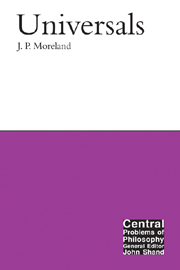Book contents
- Frontmatter
- Contents
- Preface and acknowledgements
- 1 The problem(s) of universals
- 2 Extreme nominalism and properties
- 3 Moderate nominalism and properties
- 4 Minimalist realism: Wolterstorff's kinds and Armstrong's properties
- 5 Traditional realism: properties are abstract objects
- 6 Traditional realism: issues and objections
- 7 The individuation of particulars
- Notes
- Bibliography
- Index
3 - Moderate nominalism and properties
- Frontmatter
- Contents
- Preface and acknowledgements
- 1 The problem(s) of universals
- 2 Extreme nominalism and properties
- 3 Moderate nominalism and properties
- 4 Minimalist realism: Wolterstorff's kinds and Armstrong's properties
- 5 Traditional realism: properties are abstract objects
- 6 Traditional realism: issues and objections
- 7 The individuation of particulars
- Notes
- Bibliography
- Index
Summary
In Chapter 2, reasons were given for thinking that extreme nominalism is an inadequate view of properties. However, even if this is correct, it would be premature to conclude that properties are universals because moderate nominalism – the view that properties exist and are abstract particulars – is a live option. On this view, Socrates and Plato each has its own redness, red1 and red2, respectively, and red1 and red2 are individualized properties. In this century, the three most prominent moderate nominalists have been G. F. Stout, D. C. Williams and Keith Campbell. Rather than analysing moderate nominalist treatments of predication, resemblance and abstract reference in topical fashion, it will be more useful to approach moderate nominalism by stating and evaluating the positions of its major advocates. Stout's moderate nominalism will be mentioned only briefly because although it is an important and distinctive version of moderate nominalism it has not been particularly influential, at least not in its idiosyncratic features. Williams's moderate nominalism has been appropriated, clarified and expanded by Keith Campbell, who is, arguably, the most articulate advocate of moderate nominalism. Thus, Williams's views will not be examined directly and will be mentioned only when it is helpful in clarifying the exposition of Campbell. In what follows, Stout's moderate nominalist will be investigated, followed by a detailed treatment of Campbell's position. Along the way, issues in predication, resemblance and abstract reference will be central to the dialogue.
- Type
- Chapter
- Information
- Universals , pp. 50 - 73Publisher: Acumen PublishingPrint publication year: 2001

